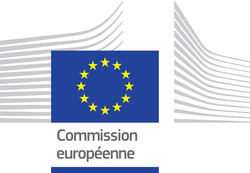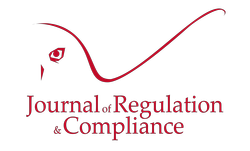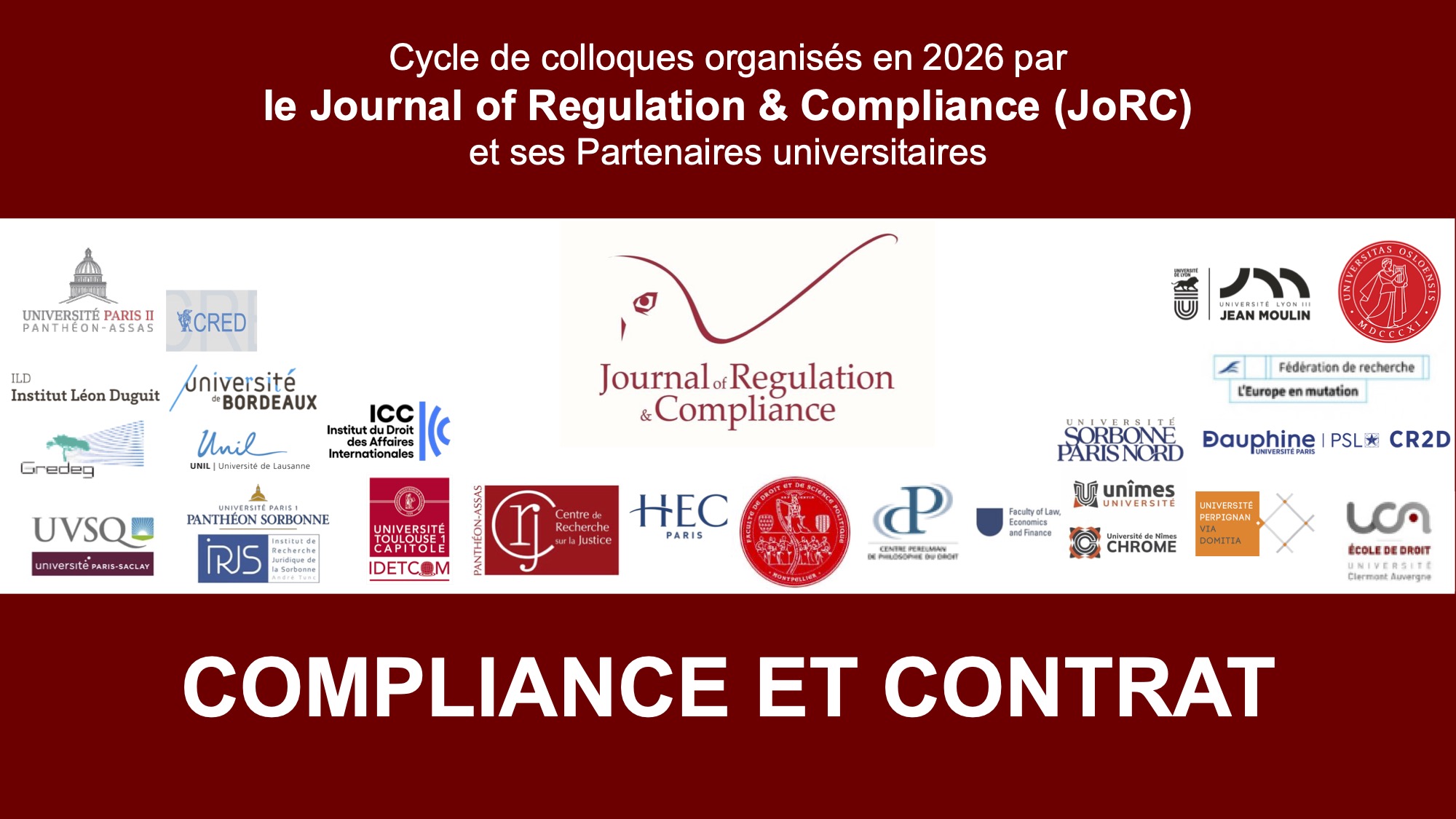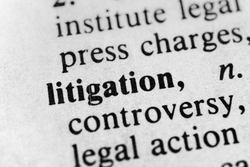Food for thoughts
Compliance and Regulation Law bilingual Dictionnary

The United States established regulatory authorities at the end of the 19th century: starting from the principle of the market, they tempered it by setting up regulators, after noting market failures, for example in terms of transport, in the event of economically natural monopolies or essential facilities. The tradition of the European Union is the reverse since the States, in particular the French State, have considered that sectors of general interest, deemed unsuitable for the competitive pattern because not corresponding to the operational pattern of the meeting of supply and demand, and to serve the missions of public services, were to be held by the State, either directly by public establishments, or by public enterprises under the supervision of the ministries.
Evolution in Europe came from community Law. Indeed, after the Second World War, the idea was to build a market which was to be "common" to European countries so that they could no longer wage war on each other in the future. To achieve this goal, the borders between them were lifted thanks to the principles of free movement of people, goods and capital. In the same way, the defense by each of the States of its own national companies by State aid has been prohibited so that any company, even foreign, can enter its territory, so that a common internal market can be established. Finally, a competition Law was necessary to prohibit companies and States from hindering the free functioning of the market, which would have slowed down or even stopped the construction of this internal market, which was an essentially political goal of the Treaty of Rome.
To carry out this political goal, the European Commission and the Court of Justice of the European Union (CJEU, previously called the Court of Justice of the European Communities - CJEC - until the Treaty of Lisbon) have prohibited any behavior of agreement or of abuse of a dominant position, even on the part of public enterprises, as well as any state support (except in the event of a crisis). Likewise, in perfect political logic, but also in perfect contradiction with European national traditions, European texts, regulations or directives have liberalized previously monopolistic sectors, first of all telecommunications and then energy. This was the case for telecommunications with the 1993 directive, the 1996 directive for electricity and the 1998 directive for gas.
Because of the hierarchy of standards, the States, except to be sued before the Court of Justice by the European Commission in action for failure, were obliged to transpose by national laws these European texts. Thus, by force, community law, both through general competition Law, but above all to achieve its political goal of building a single and initially peaceful internal market, has triggered in Europe a system of economic regulation in all network industry sectors, a system which was nonetheless foreign to the culture of the Member States. This was not the case with banking and insurance regulations, sectors which have always been threatened by systemic risk, and as such have been regulated and supervised by national central banks for a very long time.
Community Law has for 30 years plunged into national Law while ignoring them, which could also be profitable, and on the basis of competition Law, the political dimension of the European project having been forgotten, no doubt over time as the War itself faded from people's minds.
The effects of globalization and the financial crisis have constituted a new turning point in Community Law which, since 2010, has been built no longer to modify national Laws - and destroy them in part - but to build a new Community Law which should neither to Competition Law nor to National Law: Community Regulation Law, which makes room for individual rights and attempts to build over time a system that is robust to crises. Thus, by texts of the European Union of 2014, both a Banking Union and a new Law on Market Abuse is being built, which aims to establish a common law for the integrity of financial markets.
One of the challenges is what could or should be reconciliation between the two Europe, an economic and still not very social Europe on the one hand and the Europe of Human Rights, which is based on the European Convention on Rights of Man. This is not on the agenda.
Thesaurus : Doctrine

► Full Reference: J.-B. Racine, "Compliance Obligation and Human Rights", in M.-A. Frison-Roche (ed.), Compliance Obligation, Journal of Regulation & Compliance (JoRC) and Bruylant, "Compliance & Regulation" Serie, to be published
____
📘read a general presentation of the book, Compliance Obligation, in which this article is published
____
► Summary of the article (done by the Journal of Regulation & Compliance - JoRC): The author asks whether human rights can, over and above the many compliance obligations, form the basis of the Compliance Obligation. The consideration of human rights corresponds to the fundamentalisation of Law, crossing both Private and Public Law, and are considered by some as the matrix of many legal mechanisms, including international ones. They prescribe values that can thus be disseminated.
Human rights come into direct contact with Compliance Law as soon as Compliance Law is defined as "the internalisation in certain operators of the obligation to structure themselves in order to achieve goals which are not natural to them, goals which are set by public authorities responsible for the future of social groups, goals which these companies must willingly or by force aim to achieve, simply because they are in a position to achieve them". These "Monumental Goals" converge on human beings, and therefore the protection of their rights by companies.
In a globalised context, the State can either act through mandatory regulations, or do nothing, or force companies to act through Compliance Law. For this to be effective, tools are needed to enable 'crucial' operators to take responsibility ex ante, as illustrated in particular by the French law on the Vigilance Obligation of 2017.
This obligation takes the form of both a "legal obligation", expression which is quite imprecise, found for example in the duty of vigilance of the French 2017 law, and in a more technical sense through an obligation that the company establishes, in particular through contracts.
Legal obligations are justified by the fact that the protection of human rights is primarily the responsibility of States, particularly in the international arena. Even if it is only a question of Soft Law, non-binding Law, this tendency can be found in the Ruggie principles, which go beyond the obligation of States not to violate human rights, to a positive obligation to protect them effectively. The question of whether this could apply not only to States but also to companies is hotly debated. If we look at the ICSID Urbaser v. Argentina award of 2016, the arbitrators accepted that a company had an obligation not to violate human rights, but rejected an obligation to protect them effectively. In European Law, the GDPR, DSA and AIA, and in France the so-called Vigilance law, use Compliance Lools, often Compliance by Design, to protect human rights ex ante.
Contracts, particularly through the inclusion of multiple clauses in often international contracts, express the "privatisation" of human rights. Care should be taken to ensure that appropriate sanctions are associated with them and that they do not give rise to situations of contractual imbalance. The relationship of obligation in tort makes it necessary to articulate the Ex Ante logic and the Ex Post logic and to conceive what the judge can order.
The author concludes that "la compliance oblige à remodeler les catégories classiques du droit dans l’optique de les adosser à l’objectif même de la compliance : non pas uniquement un droit tourné vers le passé, mais un droit ancré dans les enjeux du futur ; non pas un droit émanant exclusivement de la contrainte publique, mais un droit s’appuyant sur de la normativité privée ; non pas un droit strictement territorialisé, mais un droit appréhendant l’espace transnational" ("Compliance requires us to reshape the classic categories of Law with a view to bringing them into line with the very objective of Compliance: not just a Law turned towards the past, but a Law anchored in the challenges of the future; not a Law emanating exclusively from public constraint, but a Law based on private normativity; not a strictly territorialised Law, but a law apprehending the transnational space".
____
🦉This article is available in full text to those registered for Professor Marie-Anne Frison-Roche's courses
________
Compliance and Regulation Law bilingual Dictionnary

The notion of "Common Goods" refers to a political conception insofar as it concerns objectively commercial goods such as cultural goods or medical services, but which the community is going to demand that everyone should have access to it even though the individual does not have the ability to pay the exact price. It is then the taxpayer - present or future - or the social partners who bear the cost, or even some companies, through the corporal social social responsibility mechanism.
This protection of Common Goods can be done by the State in the name of the interest of the social group for which it is responsible and whose it expresses the will, particularly through the notion of the general interest. In this now restricted framework which is the State, this reference runs counter to the principle of competition. This is particularly clear in Europe, which is based on a Union built on an autonomous and integrated legal order in the Member States in which competition continues to have a principled value and benefits from the hierarchy of norms. The evolution of European Law has balanced the principle of competition with other principles, such as the management of systemic risks, for example health, financial or environmental risks and the creation of the banking union shows that the principle of competition is no longer an apex in the European system.
But it still remains to an economic and financial conception of Europe, definition that the definition of the Regulatory Law when it is restricted to the management of the market failures feeds. It is conceivable that Europe will one day evolve towards a more humanistic conception of Regulatory Law, the same one that the European States practice and defend, notably through the notion of public service. Indeed and traditionally, public services give people access to common goods, such as education, health or culture.
Paradoxically, even though Law is not set up on a global scale, it is at this level that the legal notion of "common goods" has developed.
When one refers to goods that are called "global goods", one then seeks goods that are common to humanity, such as oceans or civilizations. It is at once the heart of Nature and the heart of Human Being, which plunges into the past and the future. Paradoxically, the concept of "global goods" is still more political in substance, but because of a lack of global political governance, effective protection is difficult, as their political consecration can only be effective nationally or simply declaratory internationally. That is why this balance is at present only at national level, which refers to the difficulty of regulating globalization.
Thus, the "common goods" legally exist more under their black face: the "global evils" or "global ills" or "global failures", against which a "Global Law" actually takes place. The notion of "global evils" constitutes a sort of mirror of Common Goods. It is then observed that countries that develop legal discourse to regulate global evils and global goods thus deploy global unilateral national Law. This is the case in the United States, notably in financial regulatory Law or more broadly through the new Compliance Law, which is being born. Companies have a role to play, particularly through Codes of Conduct and Corporate Social Responsibility.
Compliance and Regulation Law bilingual Dictionnary

The telecommunications sector was the first sector to be liberalized in Europe, not so much by political will but because technological progress had in fact already brought competition into the sector and it was better to organize it rather than to To allow competition to settle in disorder.
Teachings : Compliance Law

Sont ici répertoriés les sujets proposés chaque année,
- soit au titre du travail à faire en parallèle du cours, à remettre à la fin du semestre (le jour de l'examen étant la date limite de remise),
- soit les sujets à traiter sur table, sans documentation extérieure et sous surveillance le jour de l'examen final.
Retourner sur la description générale du Cours de Droit de la Compliance, comprenant notamment des fiches méthodologiques.
Thesaurus : Doctrine
Thesaurus : Doctrine

► Full Reference : E. Netter, "Les technologies de conformité pour satisfaire les exigences du droit de la compliance. Exemple du numérique" (Conformity technologies to meet the requirements of Compliance Caw. Digital example), in M.-A. Frison-Roche (dir.), L'obligation de Compliance, Journal of Regulation & Compliance (JoRC) and Dalloz, coll. "Régulations & Compliance", 2024, forthcoming.
____
📕read the general presentation of the book, L'obligation de Compliance, in which this contribution is published.
____
► English summary of this contribution (done by the Journal of Regulation & Compliance) :The author distinguishes between Compliance, which refers to Monumental Goals, and conformity, which are the concrete means that the company uses to tend towards them, through processes, check-lists in the monitoring of which the operator is accountable (art. 5.2. GRPD). Technology enables the operator to meet this requirement, as the changing nature of technology fits in well with the very general nature of the goals pursued, which leave plenty of room for businesses and public authorities to produce soft law.
The contribution focuses firstly on existing technologies. Through Compliance, Law can prohibit a technology or restrict its use because it runs counter to the goal pursued, for example the technology of fully automated decisions producing legal effects on individuals. Because it is a perilous exercise to dictate by law what is good and what is bad in this area, the method is rather one of explicability, i.e. control through knowledge by others.
Regulators are nevertheless developing numerous requirements stemming from the Monumental Goals of Compliance. Operators must update their technology or abandon obsolete technology in the light of new risks or to enable effective competition that does not lock users into a closed system. But technological power must not become too intrusive, as the privacy and freedom of the individuals concerned must be respected, which leads to the principles of necessity and proportionality.
The author stresses that operators must comply with the regulations by using certain technologies if these technologies are available, or even to counteract them if they are contrary to the goals of the regulations, but this obligation of conformity is applied only if these technologies are available. The notion of "available technology" therefore becomes the criterion of the obligation, which means that its content varies with circumstances and time, particularly in the area of cybersecurity.
In the second part of this contribution, the author examines technologies that are only potential, those that Law, and in particular the courts, might require companies to invent in order to fulfill their conformity obligation. This is quite understandable when we are talking about technologies that are in the making, but which will come to fruition, for example in the area of personal data transfer to satisfy the right to portability (GRPD), or where companies must be encouraged to develop technologies that are of less immediate benefit to them, or in the area of secure payment to ensure strong authentication (SPD 2).
This is more difficult for technologies whose feasibility is not even certain, such as online age verification or the interoperability of secure messaging systems, two requirements which appear to be technologically contradictory in their terms, and which therefore still come under the heading of "imaginary technology". But Compliance is putting so much pressure on companies, particularly digital technology companies, that considerable investment is required to achieve it.
The author concludes that this is the very ambition of Compliance and that the future will show how successful it will be.
____
🦉This article is available in full texte for persons following Professor Marie-Anne Frison-Roche teaching.
________

Organization of scientific events

► Full reference : M.-A. Frison-Roche, Scientific coprdination and co-hosting of the colloquia series Compliance and Contract, organised on the initiative of the Journal of Regulation & Compliance (JoRC) and its academic partners
____

____
► The Symposium Series in a nutshell : As a direct continuation of the previous symposium series co-organised by the Journal of Regulation & Compliance and its partner universities on "Compliance Obligation", which served as the basis for the publication of the book 📘Compliance Obligation, The series, some elements of which began in 2024 and others are already present in this book, explored in depth the specific theme of the links between compliance law and contracts. Indeed, compliance law is often analysed as the construction of laws and regulations to achieve "📘 Monumental Goals " of a political nature desired by States and public authorities, to the achievement of which systemic economic operations contribute through 📘Compliance Tools that are now well documented. Contracts are still relatively little studied, or even developed, in compliance systems that are often perceived through the orders issued, the technologies put in place and the 📘sanctions to be avoided or endured. On the contrary, the future of compliance law, particularly in its European conception, which places human beings at the centre of concerns for the sustainability of systems and the use of contracts, is the new conception that we must adopt. Contracts then appear to be both the means by which the subject company fulfils its legal obligations, forges relationships with other actors and deploys the necessary innovations. Contract law is both used and renewed as a result. The series of symposiums will examine various aspects of this general issue. It will result in the publication of a 📘book Compliance and Contrat.
____
► Presentation of symposiums in development :
- 29 May 2026🧮THE JUDGE CONFRONTED WITH CONTRACTS OF COMPLIANCE AND COMPLIANCE CLAUSES: read the presentation
- 12 June 2026🧮THE "CONTRACT OF COMPLIANCE" : read the presentation
- 25 Septembre 2026🧮COMPLIANCE: CLAUSE BY CLAUSE: read the presentation
- October 2026🧮COMPLIANCE AND COMMON CONTRACT LAW : read the presentation
- September 2026🧮COMPLIANCE, VALUE CHAINS AND CONTRACT: read the presentation
- 2 November 2026 🧮COMPLIANCE AND THE STRATEGIC CONTRACTUAL ORGANISATION OF CHAINS VALUE BY ENTERPRISES: read the presentation
________
Compliance and Regulation Law bilingual Dictionnary

"Compliance" is the typical example of a translation problem.
Indeed and for example, the term "Compliance" is most often translated by the French term "Conformité". But to read the texts, notably in Financial Law, "Conformité" is aimed rather at professional obligations, mainly aimed at the ethics and conduct of market professionals, especially service providers of investment. It is both a clearer definition in its contours (and in this more certain) and less ambitious than that expressed by the "Compliance". It is therefore, for the moment, more prudent to retain, even in French, the expression "Compliance".
The definition of Compliance is both contentious and highly variable, since according to the authors, it goes solely from the professional obligations of financial market participants to the obligation to comply with laws and regulations. In this latter sense, that is, the general obligation that we all have to respect the Law. To admit that, Compliance would be Law itself.
Viewed from the point of view of Law, Compliance is a set of principles, rules, institutions and general or individual decisions, corpus of which the primary concern is efficiency, in space and in time. The purpose is to put into practice general interest goal targeted by these gathered techniques.
The list of these goals, whether negative ("fighting": corruption, terrorism, embezzlement of public funds, drug trafficking, trafficking in human beings, organ trafficking, trafficking in poisonous and contagious goods - medicines, financial products, etc.) or positive ("fighting for": access to essential goods for everyone, preservation of the environment, fundamental human rights, education, peace , transmission of the planet to future generations) shows that these are political goals.
These goals correspond to the political definition of the Regulatory Law.
These political goals require means which exceed the forces of the States, which are also confined within their borders.
These monumental goals have therefore been internalized by public authorities in global operators. The Compliance Law corresponds to a new structuring of these global operators. This explains why the new laws put in place not only objective but structural repressions, as in France the "Sapin 2 Law" (2016) or the "obligation of vigilance Law" (2017) .
This internationalization of the Regulatory Law in companies implies that the public authorities now supervise the latter, even if they do not belong to a supervised sector, or even to a regulated sector, but participate, for example, in international trade.
The Law of Compliance thus expresses a global political will relayed by this violent new Law, most often repressive, on companies.
But it can also express on the part of the operators, in particular the "crucial operators" a desire to have themselves concern for these monumental global goals, whether of a negative or a positive nature. This ethical dimension, expressed in particular by the Corporate Social Responsibility, is the continuation of the spirit of the public service and the concern for the general interest, raised world-wide.
Teachings : Banking and Financial Regulatory Law, 2016

Le plan est actualisé chaque semaine au fur et à mesure que les leçons se déroulent en amphi.
Il est disponible ci-dessous.
Retourner à la présentation générale du cours.
(Avant le début des enseignements de Droit de la Régulation bancaire et financière, un aperçu du plan général du Cours avait été mis à disposition.)
Compliance and Regulation Law bilingual Dictionnary

The procedural guarantees enjoyed by a person whose situation may be affected by a forthcoming judgment are mainly the right of action, the rights of defense and the benefit of the adversarial principle.
The rights of the defense have constitutional value and constitute human rights, benefiting everyone, including legal persons. The mission of positive Law is to give effect to them in good time, that is to say from the moment of the investigation or custody, which is manifested for example by the right to the assistance of a lawyer or the right to remain silent or the right to lie. Thus the rights of the defense are not intended to help the manifestation of the truth, do not help the judge or the effectiveness of repression - which is what the principle of adversarial law does - they are pure rights, subjective for the benefit of people, including even especially people who may be perfectly guilty, and seriously guilty.
The rights of the defense are therefore an anthology of prerogatives which are offered to the person implicated or likely to be or likely to be affected. It does not matter if it possibly affects the efficiency. These are human rights. This is why their most natural holder is the person prosecuted in criminal proceedings or facing a system of repression. This is why the triggering of the power of a tribunal or a judge offers them in a consubstantial way to the one who is by this sole fact - and legitimately - threatened by this legitimate violence (one of the definitions of the State ).
The rights of the defense therefore begin even before the trial because the "useful time" begins from the investigation phase, from the searches, even from the controls, and continues on the occasion of appeals against the decision adversely affecting the decision. The legal action being a means of being a party, that is to say of making arguments in its favor, and therefore of defending its case, shows that the plaintiff in the proceedings also holds legal defense rights since he is not only plaintiff in the proceedings but he also plaintiff and defendant to the allegations which are exchanged during the procedure: he alleged to the allegation of his opponent is not correct.
They take many forms and do not need to be expressly provided for in texts, since they are principled and constitutionally benefit from a broad interpretation (ad favorem interpretation). This is the right to be a party (for example the right of intervention, the right of action - which some distinguish from the rights of the defense - the right to be questioned, such as the right to be brought into question (or examination), right to be assisted by a lawyer, right to remain silent, right not to incriminate oneself, right of access to the file, right to intervene in the debate (the rights of the defense thus crossing the adversarial principle), right to appeal, etc.
It is essential to qualify an organ as a tribunal because this triggers for the benefit of the person concerned the procedural guarantees, including the rights of the defense, which on the basis of Article 6 of the European Convention on Human Rights man was made about the Regulators yet formally organized in Independent Administrative Authorities (AAI). This contributed to the general movement of jurisdictionalization of Regulation.
Compliance and Regulation Law bilingual Dictionnary

The procedural safeguards enjoyed by a person whose situation may be affected by a future judgment are principally the right to bring proceedings before the court, the rights of the defense and the benefit of the contradictory principle.
The legal action was for a long time considered as a "power", that is to say, a mechanism inserted in the organization of the judicial institution, since it was by this act of seizure, access by which the person enters the judicial machine, through the latter starts up.
But in particular since the work of René Cassin and Henri Motulsky, legal proceedings are considered as a subjective right, that is to say, a prerogative of any person to ask a judge to rule on the claim that the plaintiff articulates in an allegation, that is a story mixing the fact and the law in a building and on which he asks the judge to give an answer, such as the cancellation of an acte, or the award of damages, or the refusal to convict him (because the defense is also the exercise of this right of action).
The legal action is now recognized as a "right of action", the nature of which is independent of the application made to the court, a subjective procedural right which doubles the substantive subjective right (eg the right to reparation) and ensures the effectiveness of the latter but which is autonomous of it. This autonomy and this uniqueness in contrast with the variety of the sort of disputes (civil, criminal or administrative) makes the right of action a pillar of the "Procedural Law" on which a part of European and Constitutional Law are built. In fact, Constitutional Law in Europe is essentially constituted by procedural principles (rights of defense, impartiality, right of action), since the principle of non bis in idem is only an expression of the right of action. Non bis in idem is a prohibition of double judgment for the same fact which does not prohibit a double trigger of the action (and criminal, civil and administrative). This unified due process of Law has helped to diminish the once radical separation between criminal law, administrative law and even civil law, which are clearly separated from one another in the traditional construction of legal systems and which converge today in the Regulatory and Compliance Law.
Moreover, the subjective right of action is a human right and one of the most important. Indeed, it is "the right to the judge" because by its exercise the person obliges a judge to answer him, that is to say to listen to his claim (the contradictory resulting therefore from the exercise of the right of action ).
Thus the right of action appears to be the property of the person, of the litigant, of the "party". This is why the attribution by the law of the power for the Regulators to seize itself, which is understood by reason of the efficiency of the process, poses difficulty from the moment that this constitutes the regulatory body in "judge and party", since the Regulator is in criminal matters regarded as a court, and that the cumulation of the qualification of court and of the quality of party is a consubstantial infringement of the principle of impartiality. In the same way, the obligation that Compliance Law creates for operators to judge themselves obliges them to a similar duplication which poses many procedural difficulties, notably in internal investigations.
There is a classical distinction between public action, which is carried out by the public prosecutor, by which the public prosecutor calls for protection of the general interest and private action by a person or an enterprise, which seeks to satisfy its legitimate private interest. The existence of this legitimate interest is sufficient for the person to exercise his or her procedural right of action.
In the first place, the person could not claim the general interest because he or she was not an agent of the State and organizations such as associations or other non-governmental organizations pursued a collective interest, which could not be confused with the general interest. This procedural principle according to which "no one pleads by prosecutor" is today outdated. Indeed, and for the sake of efficiency, Law admits that persons act in order that the rule of law may apply to subjects who, without such action, would not be accountable. By this procedural use of the theory of incentives, because the one who acts is rewarded while and because he or she serves the general interest, concretizing the rule of law and contributing to produce a disciplinary effect on a sector and powerful operators, procedural law is transformed by the economic analysis of the law. The US mechanism of the class action was imported into France by a recent law of 2014 on "group action" (rather restrictive) but this "collective action" , on the Canadian model, continues not to be accepted in the European Union , Even if the European Commission is working to promote the mechanisms of private enforcement, participating in the same idea.
Secondly, it may happen that the law requires the person not only must have a "legitimate interest in acting" but also must have a special quality to act. This is particularly true of the various corporate officers within the operators. For the sake of efficiency, the legal system tends to distribute new "qualities to act" even though there is not necessarily an interest, for example in the new system of whistleblowers, which can act even there is no apparent interest.
Compliance and Regulation Law bilingual Dictionnary

Le légicentrisme exprime avant tout une bataille de normes, puisque cette doctrine pose que la loi est la seule et unique expression de la souveraineté de la Nation. En cela, la loi dispose d'une autorité indépassable et c'est elle qui fonde l'État légal.
Ainsi, si l'on devait donner une figure au système juridique, ce serait un cercle avec en son cœur d'une façon unique la loi souveraine, à la fois autosuffisante dans son fondement (souveraineté) et dans sa production (principe de légalité).
Cette conception moniste (unité de la loi) a pour principale source la philosophie politique de Jean-Jacques Rousseau, c'est encore sur celui-ci que la France conserve le principe de souveraineté parlementaire (le Gouvernement est responsable devant le Parlement) et de souveraineté de la loi. Mais depuis la Révolution française, les esprits et les faits ont changé.
Ainsi, s'est construite une doctrine inverse : le "pluralisme juridique" qui pose en contradiction que le droit vient de nombreuses sources, comme la coutume, les pratiques, les jugements, etc. Il n'est pas étonnant que les auteurs qui affirment le pluralisme juridique ne viennent pas de la philosophie politique mais davantage de la sociologie comme Gurvitch ou Carbonnier.
En outre, les frontières nationales ont perdu de leur consistance, de fait et de droit. C'est pourquoi un auteur comme Mireille Delmas-Marty s'appuie sur le fait même de la construction de l'Europe des droits de l'homme d'une part et de la globalisation d'autre part pour affirmer que le légicentrisme a fait place à un pluralisme juridique généralisé.
Cependant, en droit positif les textes restent les mêmes. C'est ainsi que l'article 6 de la Déclaration des droits de l'homme et du citoyen de 1789, qui fait partie du bloc de constitutionnalité, dispose de la loi que "la loi est l'expression de la volonté générale".
De la même façon, l'article 5 du Code civil continue d'interdire au juge de rendre des jugements contraignants pour d'autres cas que celui particulier sur lequel il se prononce.
Cette permanence des textes les plus gradés, à savoir l'article 5 du Code civil et l'article 6 de la déclaration pose de nombreux problèmes aux juges. En effet, depuis l'arrêt du Tribunal des conflits Blanco, le droit administratif n'est plus lié par ce qui est posé par le Code civil et sans doute la puissance normative du Conseil d'Etat s'exprime plus ouvertement que celle de la Cour de cassation, qui feint de ne rendre que des arrêts de principe pour pouvoir affirmer qu'elle ne rend pas d'arrêt de règlement.
D'une façon plus complexe, le Conseil constitutionnel rappelle régulièrement que certes il est le gardien de la norme constitutionnelle supérieure à la loi mais quand le même temps, seul le législateur, puisque celui est le souverain, peut exprimer la volonté générale, ce à quoi le Conseil constitutionnel ne peut se substituer.
Mais le Droit de l'Union européenne, qui constitue un Ordre juridique à la fois autonome et dont les normes sont pourtant intégrées dans les ordres juridiques des Etats-membres, rend difficilement soutenable la conception du légicentrisme. Y a succédée une hiérarchie des normes complexes. Mais les fondements politiques de l'idée de légicentrisme alimente en grande partie l'hostilité à l'égard de l'Europe, aussi bien celle de l'Union que celle de la CEDH.
Compliance and Regulation Law bilingual Dictionnary

Banks are regulated because they do not engage in an ordinary economic activity, as their are likely to create systemic risk. In the real economy indeed, banks play the role of providing credit to entrepreneurs who operate on the markets for goods and services. These credits are mainly financed through deposits made by depositors and, to a lesser extent, by shareholders (i.e., capitalists). That is how liberalism and capitalism are bound up. However, banks also have the power to create money by the book entries they make when they grant loans ('book money'). As such, the banks share with the State this extraordinary power to exercise monetary authority, which some describe as sovereign power. It is possible that the digital eventually calls this power into question, since the Regulation currently hesitates to seize control over new instruments that are called "virtual currency" and that are used as proper "currency" or as an ordinary instrument for cooperative relation.
Banks' prominent sovereign character justifies, first and foremost, that the State is granted the power to choose the institutions which benefit from the privilege of creating book money- in this regard, the banking industry has always been a monopoly. Hence, Banking Regulation is first an ex ante control to enter the profession, and also a careful monitor of the people and institutions that claim they are in.
In addition, banks and credit institutions lend more money than their own funds can allow: the whole banking system is necessarily based on the trust that each creditors place within the bank, including depositaries who leave their funds at the banks' disposal for it to use them. That is where Bank Regulation intervenes to establish what is called 'prudential ratios', i.e., ratios that ensure the soundness of the institution by determining the amount of money that banks can lend based on the equity and quasi-equity they actually have.
Moreover, banks are constantly monitored by their supervisory Regulator, the Central Bank (in France, the Banque de France) that ensures the safety of the whole system by setting the State as the lender of last resort. This can, however, incentivize a large financial institution to take excessive risks based on its reliance on the fact that the State will save it eventually- that is what the 'moral hazard' theory systematized. All monetary and financial systems are built on these central banks that are independent from governments, which are far too reliant on political strategies and which cannot generate the same trust that a Central Bank inspires. Since the missions of central banks have increased over the years, and since the notions of Regulation and Supervision have come together, we tend to consider that Central Banks are now fully fledged Regulators.
Besides, Banking Regulation has become all the more central since banking is no longer primarily about loaning but rather about financial intermediation. Banking Regulation and Financial Regulation are mixing. In Europe , European Central Bank is in the center.
Thesaurus : Doctrine

Complete reference : Archives de Philosophie du Droit (APD), Droit et économie, tome 37, ed. Sirey, 1992, 426 p.
Read the summaries of the articles in english.
See the presentation of others volumes of Archives de Philosophie du Droit.
Thesaurus : Doctrine
► Référence complète : D. Esty et M. Hautereau-Boutonnet, "Derrière les procès climatiques français et américains : des systèmes politique, juridique et judiciaire en opposition", D.2022, p.1606 et s.
____
Thesaurus : Doctrine

► Full Reference: B. Sillaman, "Taking the Compliance U.S. Procedural Experience globally", in M.-A. Frison-Roche (ed.), Compliance Jurisdictionalisation, Journal of Regulation & Compliance (JoRC) and Bruylant, coll. "Compliance & Regulation", to be published.
____
📘read a general presentation of the book, Compliance Jurisdictionalisation, in which this article is published
____
► Summary of the article (done by the Journal of Regulation & Compliance): The French legal system is evolving, organizing interaction between lawyers with regulators and prosecutors, specially in investigations about corruption or corporate misconduct, adopting U.S. negotiated resolutions such as the Convention judiciaire d'intérêt public, which encourages "collaboration" between them.
The author describes the evolution of the U.S. DOJ doctrine and askes French to be inspired by the U.S. procedural experience, U.S. where this mechanism came from. Indeed, the DOJ released memoranda about what the "collaboration" means. At the end (2006 Memorandum), the DOJ has considered that the legal privilege must remain intact when the information is not only factual in order to maintain trust between prosecutors, regulators and lawyers.
French authorities do not follow this way. The author regrets it and thinks they should adopt the same reasoning as the American authority on the secret professionnel of the avocat, especially when he intervenes in the company internal investigation.
____
🦉This article is available in full text to those registered for Professor Marie-Anne Frison-Roche's courses
________
Thesaurus : Doctrine
Référence complète : Boursier, M.-E., L’irrésistible ascension du whistleblowing en droit financier s’étend aux abus de marché, Bulletin Joly Bourse, 1ier septembre 2016.
Les étudiants de Sciences po peuvent lire l'article en accédant au dossier "MAFR - Régulation"
Compliance and Regulation Law bilingual Dictionnary

It can not be defined as the absolute positive aptitude, namely the total absence of prejudice, the heroic aptitude for a person to totally ignore his or her personal opinions and personal history. This heroic virtue is nonsense because not only is it inaccurate, impossible but it is also not desirable because a person is not a machine. It must not be so because good justice is human justice. In this respect, impartiality refers to a philosophical conception of what is justice and what is Regulation, not machines, but systems that must keep the human person in their center (Sunstein).
Thus Impartiality is articulated with the subjective nature of the assessment not only inevitable but also desirable that the judge makes of situations. Because Law is reasonable, Impartiality is defined only negatively: the absence of bias.
Impartiality is defined first and foremost as a subjective and individual quality, namely, the prohibition on the person who makes a decision affecting the situation of others (as is the case of a judge) to a a personal interest in this situation. The constitutional prohibition of being "judge and party" is thus the expression of the principle of impartiality. This definition is in line with the otherwise general requirement of no conflict of interests.
Impartiality is defined secondly as an objective and individual quality, namely the prohibition for a person who has already known of the case to know again (because he or she has already had an opinion about it, this having constituted an objective pre-judgment).
Impartiality is defined thirdly as an objective and structural quality, which obliges the organ which takes judgments to "give to see" a structure that makes it fit for this impartiality, objective impartiality that third parties can see and which generates confidence in its ability to judge without bias. This theory of English origin has been taken up by European law in the interpretation given to the European Convention on Human Rights. The expression "apparent impartiality" has sometimes given rise to misunderstandings. Indeed, far from being less demanding (in that it is "only" to be satisfied with an appearance of impartiality and not of a true impartiality), it is rather a matter of demanding more, not only of a true impartiality, but also of an impartiality which can be seen by all. This leads in particular to the obligation of transparency, to which the institutions, notably the State, were not necessarily bound by the law.
For a long time the Regulator, in that it took the form of an Administrative Authority, was not considered a jurisdiction, it was long considered that it was not directly subject to this requirement. It is clear from the case law that the national courts now consider that the regulatory authorities are courts "in the European sense", which implies a fundamental procedural guarantee for the operators concerned
Compliance and Regulation Law bilingual Dictionnary

Control is a concept so central in Regulation that, in the difficult exercise of translation, the English term of "Regulation" or the expression "Regulatory system" are often translated, for example in French,, by the French word "control" (contrôle). Indeed, the Regulator controls the sector for which he is responsible. This control is carried out ex ante by the adoption of standards of behavior, whether the Regulator prohibits behavior or obliges the operators to do so. In addition, the Regulators exercises his control powers through the power to approve companies entering the sector or the power to certify certain types of products sold on the markets for which he is responsible. In addition, he continuously monitors the sectors for which he is responsible since his function is either to construct them to bring them to maturity or to remain in balance between the principle of competition and another concern, for example to ensure that they do not fall into a systemic crisis.
These ex ante controls radically distinguish the regulatory authority from the competition authority, which intervenes only ex post. Finally, the regulatory authority controls the sector in ex post: in this he works on a temporal continuum, sanctioning the failings he finds on the part of the operators to the prescriptions he has adopted himself. he often has the power to settle disputes if two operators compete in a dispute between them and bring it before him.
This control function specific of the regulatory authority, which it often shares with the traditional administration and which opposes it to the activity of the competition authority and the courts, is made difficult by its possible lack of independence. Indeed, because the Regulator is a State boddy, if the regulator has to control a public operator, it may risk being captured by the government, since the whole organization of the regulatory system must therefore ensure its independence not only statutory but also budgetary in relation to it. This risk of capture is permanent not only because of the government but also because of the sector. Secondly, control can be inefficient if the regulator lacks adequate, reliable and timely information, risk generated by information asymmetry.
To fight against this, according to the childish image of the stick and the carrot, we must at the same time give the regulator powers to extirpate information that the operators do not want to provide, the texts never ceasing to give regulators new powers, such as perquisitions power ou sanction ou settlemeent. Symmetrically, operators are encouraged to provide information to the market and the regulator, for example through leniency programs or the multiplication of information to be inserted in company documents. Finally, there is a difficult balance between the need to combat the capture of the regulator and the need to reduce the asymmetry of information since the best way for the latter to obtain information from the sector is by frequent attendance by operators: , This exchange that they accept very willingly is the open voice to the capture. It is therefore an art for the regulator to keep operators at a distance while obtaining from them information that only untended relationships allow him to obtain.
Moreover, the Compliance Law which is in the process of being put in place is intended to resolve this major difficulty, since the operator becomes the primary agent for the implementation of the Regulation Law, whose aims are internalized in the " crucial " and global operators perator, operator crucial and global, the Regulator ensuring the effective structural change of the operator to realize these goals of this Global Regulation Law.
Thesaurus : Doctrine

Référence complète : Salah, M., La mondialisation vue de l'Islam, in Archives de Philosophie du Droit, La mondialisation entre illusion et utopie, tome 47, Dalloz, 2003, 27-54.
La mondialisation apparaît comme une occidentalisation des cultures et du droit. L'Islam qui prend forme juridique devrait se l'approprier sans se dénaturer. La réussite d'un tel processus difficile dépendra de la qualité de la régulation qui sera mise en place.
Lire une présentation générale de l'ouvrage dans lequel l'article a été publié.
Les étudiants de Sciences po peuvent via le drive lire l'article dans le dossier "MAFR - Régulation".
Thesaurus : Doctrine
Référence générale, Cohendet, M.-A. et Fleury, M., Droit constitutionnel et droit international de l'environnement, Revue française de droit constitutionnel , PUF, » 2020/2, n°122, p.271-297.
___
Résumé de l'article :
Thesaurus : Doctrine
►Référence complète : Galli, M., Une justice pénale propre aux personnes morales : Réflexions sur la convention judiciaire d'intérêt public , Revue de Sciences Criminelle, 2018, pp. 359-385.
____
Thesaurus : Doctrine

► Full Reference: Deffains, B., Compliance and International Competitiveness, in Frison-Roche, M.-A. (ed.), Compliance Monumental Goals, series "Régulations & Compliance", Journal of Regulation & Compliance (JoRC) and Bruylant, to be published.
____
► Article Summary: Compliance, which can be defined first and foremost as obedience to the law, is an issue for the company in that it can choose as a strategy to do or not to do it, depending on what such a choice costs or brings in. This same choice of understanding is offered to the author of the norm, the legislator or the judge, or even the entire legal system, in that it makes regulation more or less costly, and compliance with it, for companies. Thus, when the so-called “Vigilance” law was adopted in 2017, the French Parliament was criticized for dealing a blow to the “international competitiveness” of French companies. Today, it is on its model that the European Parliament is asking the European Commission to design what could be a European Directive. The extraterritoriality attached to the Compliance Law, often presented as an economic aggression, is however a consubstantial effect, to its will to claim to protect beyond the borders. This brings us back to a classic question in Economics: what is the price of virtue?
In order to fuel a debate that began several centuries ago, it is first of all on the side of the stakes that the analysis must be carried out. Indeed, the Law of Compliance, which is not only situated in Ex Ante, to prevent, detect, remedy, reorganize the future, but also claims to face more “monumental” difficulties than the classical Law. And it is specifically by examining the new instruments that the Law has put in place and offered or imposed on companies that the question of international competitiveness must be examined. The mechanisms of information, secrecy, accountability or responsibility, which have a great effect on the international competitiveness of companies and systems, are being changed and the measure of this is not yet taken.
____
________